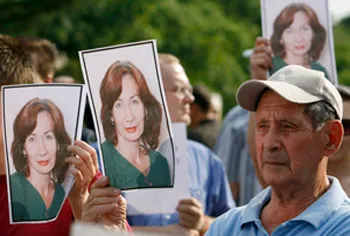We were only 30 on Friday: representatives of human rights organizations, a few journalists and academics, a couple of anonymous “concerned citizens.” Standing on the Place de la Liberté (Freedom Square) in Brussels two blocks from the Parliament, a few meters away from a police team that had asked us to limit ourselves to a “static demonstration,” we held pictures of Natalya Estemirova and roses. A few journalists–the Belgian news agency, Reuters Television, a community TV station–were filming the scene. Scores of people were walking by on their way from lunch back to office work.
“It is Friday, in the middle of the holiday season,” reasoned one of the demonstrators. “The members of the European Parliament are in Strasbourg for their inaugural session. You’ll see: The next time we organize something for Natasha we’ll be many more”.
The contrast could not have been wider between this tiny group of demonstrators and the deluge of articles and statements condemning Natalya’s killing and praising her courage. In the mainstream media, on Facebook, in e-mail groups, Natalya’s murder had been prominently reported and commented on. Editorials celebrated her commitment and denounced the culture of impunity in Russia. Many writers pointed an accusing finger at the Chechen president and called on Medvedev and Putin to investigate. Usually cautious in their relations with Russia, many EU officials expressed their indignation and asked for justice.
Natalya Estemirova was well-known as a human rights defender. She had been in Brussels various times on advocacy trips and had received an award from the European Parliament. Very few, however, were aware of her journalism work.
Natalya wrote regularly for the Caucasus news Web site Kavkazsky Uzel and for Novaya Gazeta, Anna Politkovskaya’s newspaper. The two had worked together on stories. Besides her own writing, she had played a key role in getting the news out of Chechnya by providing other journalists with facts. To some extent, international media organizations were relying on her to cover a region that they considered too dangerous or too far from current news priorities to send their own reporters.
Natalya brought to her human rights investigations the best of a journalist’s commitment to dig out and check the uncomfortable facts, to be rigorously impartial and to act as a watchdog on arbitrary power.
Listening to the speakers deploring the loss of a combative woman daring to speak up, I was thinking of a famous sentence pronounced by late Newsday star investigative journalist Bob Greene when Arizona Republic reporter Don Bolles was murdered in Phoenix in 1976: “You don’t kill a story by killing a journalist.”
The best tribute to Natalya’s work will be the dedication to find who killed her and who ordered the killing but also to make sure that the stories that she investigated and that Chechen and Russian authorities want to suppress will be uncovered and disseminated around the world.
